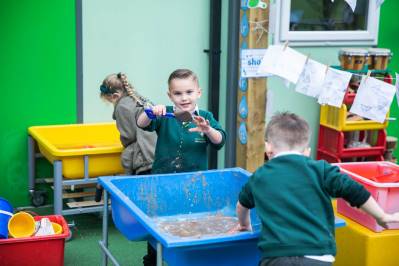Early years foundation stage at Greenlands
Every child deserves the best possible start in life and support to fulfil their potential. A child’s experience in the early years has a major impact on their future life chances. A secure, safe and happy childhood is important in its own right, and it provides the foundation for children to make the most of their abilities and talents as they grow up.
Department for Children Schools and Families 2007
Provision
We have one Reception Class with a maximum of 30 children.
EYFS Curriculum
At Greenlands we follow the Early Years Statutory Framework. This framework specifies the requirement for learning and development in the Early Years and provides prime and specific areas of learning we must cover in the curriculum.
For more information regarding the Statutory Framework please visit Foundation stage curriculum
The Learning Environment
A rich and varied environment supports children’s learning and development. It gives them the confidence to explore and learn in secure and safe, yet challenging, indoor and outdoor spaces. We aim to create an attractive, welcoming and stimulating learning environment which will encourage children to explore, investigate and learn through first-hand experience. We also aim to make it a place where children feel secure and confident, and are challenged to develop their independence.
The learning environment is divided into different areas: domestic role play, book corner, writing area, Numeracy area, creative, malleable, sand, water, outside, construction and small world. These areas are carefully arranged to encourage quiet areas and more active areas within the learning environment.
Adult led focus activities are planned to explicitly teach the children the crucial content and skills they need to acquire in the EYFS, whilst the carefully thought out provision enhancements allow them to continually revisit that knowledge and rehearse learnt skills. Children are encouraged to become independent learners and to take some responsibility for initiating their own lines of enquiry and investigation.
Early Years
Supporting your Child
Once your child is fully settled into life in reception, they will be given a reading book to read at home with you. They will also bring home a phonics book containing graphemes of taught sounds and key words cards to consolidate their learning from school.
We encourage you to keep supporting your child’s learning and development at home, in fun and practical ways that you can enjoy together. This will have a huge impact on your child’s confidence as a learner. For example
- Talk about the numbers, colours, words and letters you see when you are out and about
- Sing and share nursery rhymes
- Share books and make up stories
- Cook/bake a variety of healthy snacks
- Talk to your child at every opportunity
- Explore the park at a different time of the year – go off the beaten track!
We also offer a variety of Parent Workshops in Term 1 & 2, including ‘Phonics & Early Reading’ and ‘Early Maths’ to inform you with tips and strategies to further support your child at home.
Assessment
At the end of the EYFS – in the summer term of the reception year in school – an end of EYFS assessment, known as the EYFS Profile will be carried out. This assessment is carried out by the reception teacher and is based on what they, and other staff caring for your child, have observed over a period of time.
Another important part of the EYFS Profile is your knowledge about your child’s learning and development, so do let your child’s class teacher know about what your child does with you: such as how confident your child is in writing their name, reading and talking about a favourite book, speaking to people your child is not so familiar with or their understanding of numbers.
All of the information collected is used to judge how your child is doing in the 7 areas of learning and development. Finding out at this stage how your child is doing will mean that the teacher your child has in their next school year – Year 1 – will know what your child really enjoys doing and does well, as well as helping them decide if your child needs a bit of extra support, what that support should be and if they are already getting it.
We will give you a report of your child’s progress, including information from his or her EYFS Profile at the end of the summer term.





























